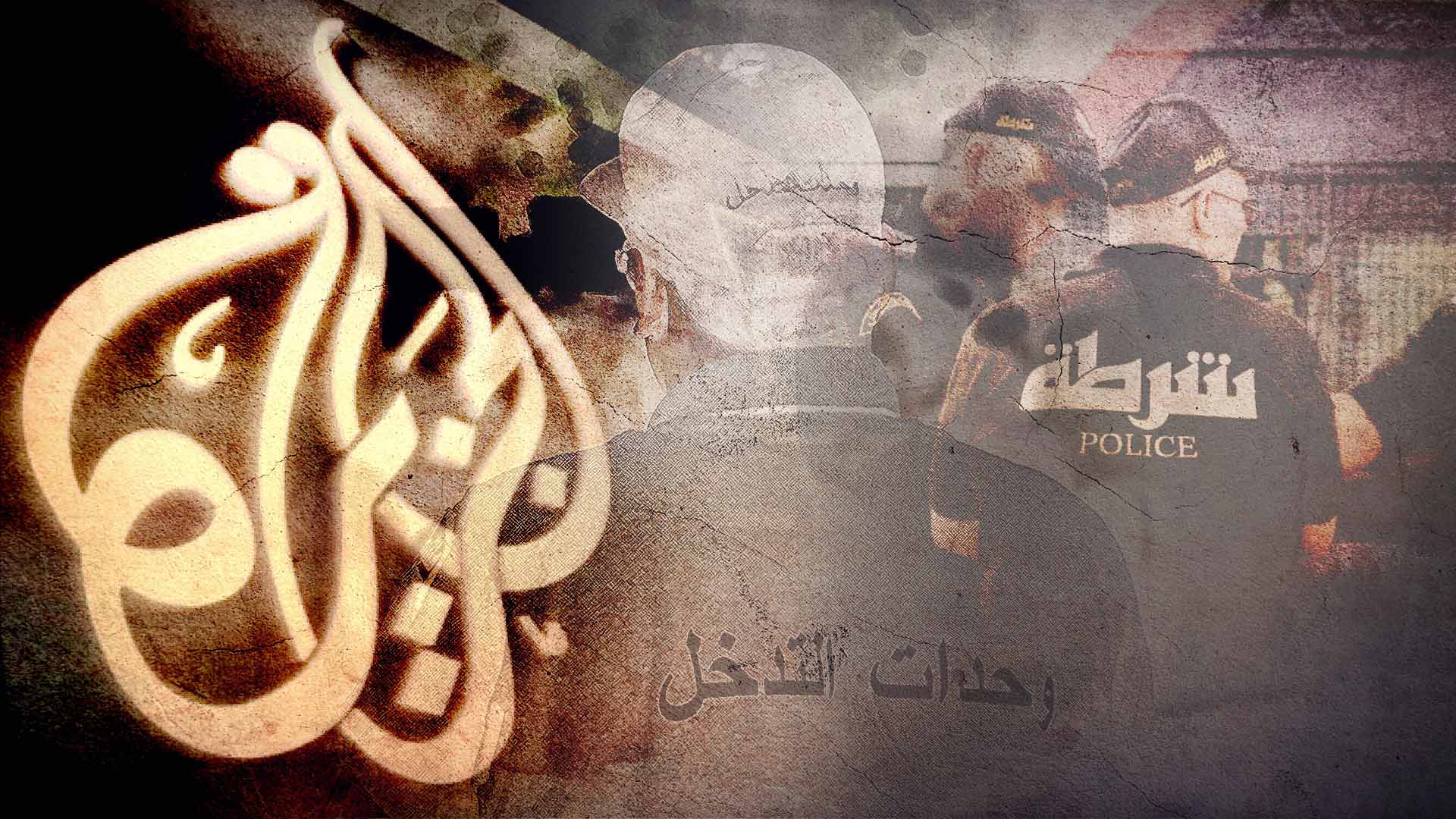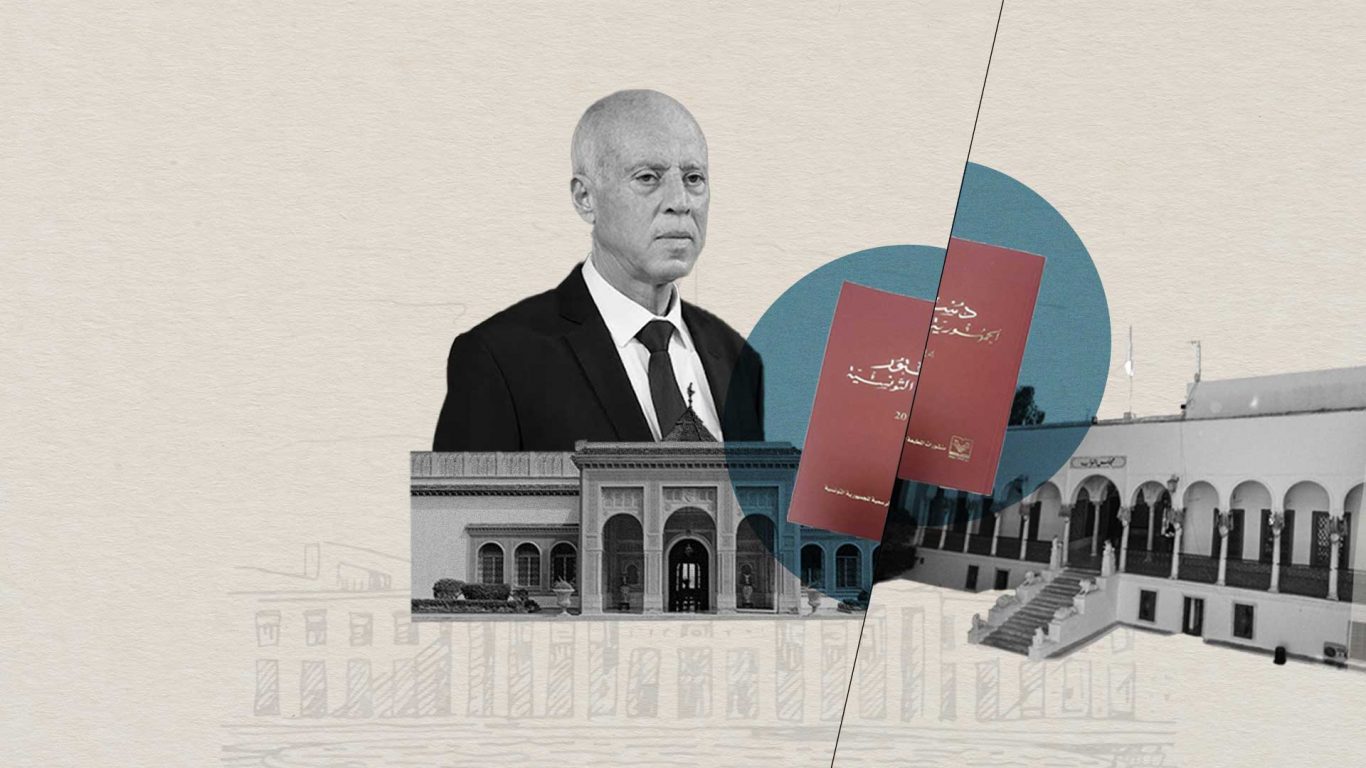As it is forbidden to use the building's new elevator, the eight story staircase leading to the Al Jazeera office must be embarked upon by foot, a strategy that discourages people from attempting to reach the premises. At the entrance, the building's security guard questions anyone trying to enter. "The police explained to us that it was forbidden to go up to the eighth floor, as Al Jazeera's premises are under police control, with officers surrounding them at all times", he said.
Neither the interior nor the exterior of the building, which is located in the centre of El Omrane supérieur, indicates the presence of Al Jazeera's offices. Similarly, the police officers are not visible from the outside. Even the building's security guard is unable to explain the rationale behind the shutdown. His answer is no different from that given by the police, who claim, behind a closed door, that they are only enforcing the directives of the Ministry of the Interior.
Who is responsible?
Despite waiting at the entrance of the Ministry of Interior for half an hour, inkyfada was not allowed to enter the information and communication office, under the pretext of not having made an appointment. Meanwhile, Khaled Hayouni, head of communication at the ministry, insisted that he had been on sick leave for a week and a half and was therefore unable to provide a statement.
Later on, inkyfada contacted two other officials at the information and communication office. Like Hayouni, they claimed to have also been on leave and to not be authorised to issue statements on his behalf. One of them then spoke to an employee at the reception of the information and communication office, and after a short wait, the latter confirmed that only Hayouni had the necessary authority to make statements on this matter, sending inkyfada back to square one.
"At a communications level, the Ministry of the Interior is currently unavailable, there is no resource to turn to for any information", says Mehdi Jlassi, a member of the Tunisian journalists' union. He confirms that the journalists' union is monitoring the shutdown of the premises very closely, but that no progress has been made, given the absence of entities capable of providing any information. He continues: "We have tried to contact the Ministry of the Interior, but to no avail. We cannot find anybody with which we can negotiate and revoke this decision.”
"The Presidency of the Republic denies any responsibility for the intrusion of the channel's premises on July 26", said Mehdi Jlassi, who was present at a meeting between Kaïs Saïed and civil human rights associations on July 27. The journalists’ union had issued a statement ahead of the meeting, calling on the President "to urgently and immediately intervene to ensure press freedom and to fight against illegal actions, in accordance with the Constitution". The union also said in the statement that it "fears that these events are the result of retaliation against media institutions for their editorial lines, by people supporting the recent decisions made by President Kaïs Saïed".
On the same subject
Meanwhile, inkyfada tried to obtain answers from the Presidency, relentlessly trying to contact the communication advisor Walid Hajjem for four days, as well as trying the official e-mail account. The attaché in charge of presidential communication, Ihsen Sbabti, finally confirmed that it is difficult to obtain all the data at the moment, stating that it would be possible for us to publish this article, while waiting for more clarification.
"For the time being, the responsibility remains with the police, who trespassed without having received a legal order to shut down the premises. Indeed, there is no open criminal investigation concerning Al Jazeera, which places the matter within the framework of illegal activity and abuse of power", argues Khaoula Chabah, in charge of documenting abuses and safety standards at work within the Tunisian Journalists' Union.
Chabah continues: "Al Jazeera's legal case file does not contain any concerns regarding authorisations or taxes. The case does not concern the legal status of the channel, but rather its editorial line. We have contacted the Ministry of the Interior, which has not provided us with any explanation.”
HOW WERE THE PREMISES TRESPASSED?
Just before 10 a.m. on July 26, while on air with Al Jazeera to cover the demonstrations surrounding the National Assembly, Lotfi Hajji, the local channel's bureau director, said that the premises had been forcibly entered by the police. Before he had even finished his report, he switched off his phone and went to the office to obtain an explanation for this intervention.
"Between 25 and 30 police officers, some of them dressed in civilian clothing, entered through the emergency exit and then spread out across the premises. They asked everyone to immediately leave, preventing them from filming the events", he told inkyfada.
"I asked the officer in charge to present me with a legal order, he replied that he was only carrying out the orders of the Ministry of the Interior, and that they were members of law enforcement agencies within the Tunis region."
"I confronted him with the illegality of his actions, but he maintained that he was only carrying out the directives he had received.”
"The police then seized and withheld the keys to the office, preventing us from entering the premises or even working in the field until a new decision is reached in cooperation with the union", he said.
According to Hajji, the police officers forced the journalists to switch off their phones during the intrusion to prevent them from filming them. Hajji called on the President of the Republic to "respect his declarations, in which he guarantees protection of press freedom and respect for the rights of journalists, by reopening the premises and allowing the shutdown decision to be appealed".
A rumour has been circulating since July 27 that the shutdown was due to Al Jazeera's insistence on covering a meeting attended by the dismissed head of government, Hichem Mechichi. The latter was said to be announcing his opposition to the decisions made by Kaïs Saïed, inviting the security forces to oppose them. "A simple, ridiculous tale", commented Hajji regarding this rumour.
"Mechichi does not need Al Jazeera to broadcast his meeting live", he adds, "He is perfectly capable of doing so using the basic means at his disposal, be it his communication team, or even his personal phone". Furthermore, Hajji denies having had any relationship or communication with Mechichi, even throughout his tenure as head of government, and claims that he can easily prove this through his personal phone.
For the time being, Al Jazeera has not issued any official position regarding the shutdown of its premises in Tunis and no requests have been made. The broadcaster has been content with quickly covering the events, calling on certain human rights or freedom of press associations that denounce the intrusion, such as Reporters Without Borders.
Inkyfada sent an email to the Al Jazeera channel in Qatar to inquire about its official position, and any efforts being made to reclaim their offices, but received no response.
ARRESTED AND "ACCUSED" OF WORKING FOR AL JAZEERA
"We became a source of distrust and they even looked for us in the areas around the parliament", reveals a journalist who works at the station, but prefers to remain anonymous. It would appear that at the same time as the police burst into the offices on July 26, other officers were heading towards the ARP to arrest the Al Jazeera reporters. This would then be the reason why the police seized the phones of several journalists, according to the statement issued by the Tunisian journalists' union.
"I am not the only one whose phone was confiscated. We were four journalists, me and my colleague from Tunisie Numérique, a journalist from Anadolu Agency, and a journalist from the Tuniscope website", Meriem Khamassi told Inkyfada. "When we arrived in front of the police car, the officers recorded our identities and gathered data from the seized phones. They then told us that they would return them to us later, within an hour or an hour and a half."
According to Meriem Khamassi, after about an hour of waiting by the car, the officer who had confiscated her phone returned to tell her and her colleagues that they should come to the Bardo police station. "When we arrived at the station, the officers handed us a report, with the charge of broadcasting live for Al Jazeera." She added: "The interrogation continued for one and a half hours in the presence of a lawyer sent out by our media institution, and we were released [only] after proving that we did not work for the channel."
"They assumed that we work for Al Jazeera because they were broadcasting live at the same location, at the same time, and we were there", she summarised. "The case is closed, but we will continue to pursue the matter with the journalists' union. The way we were treated by the police officer who arrested us was despicable. In the police station, on the other hand, the treatment was in accordance with the law."
With no response from the Ministry of the Interior or the Presidency, Inkyfada turned to the police in Bardo. The regional director denied the accusations, deeming the events described as a simple routine control, to ensure that the journalists were in possession of the proper authorisations to film.
When confronted with the accounts of the journalists whose phones were seized, the regional director denied the events. He said that any journalist is able to work freely in the area. "We have no connection with the shutdown of the Al Jazeera offices, and are dealing with the matter in a purely security-related manner. We just ask for press cards and authorisations to film. We had not received any directives regarding the journalists who claim to have been detained, or regarding their relationship with Al Jazeera", he said.
More than 10 days following the events at Al Jazeera's offices in Tunisia, and the appointment of an interior ministry official by the President (who has repeatedly claimed to protect press freedom), the motives and those responsible for the shutdown remain unknown.






